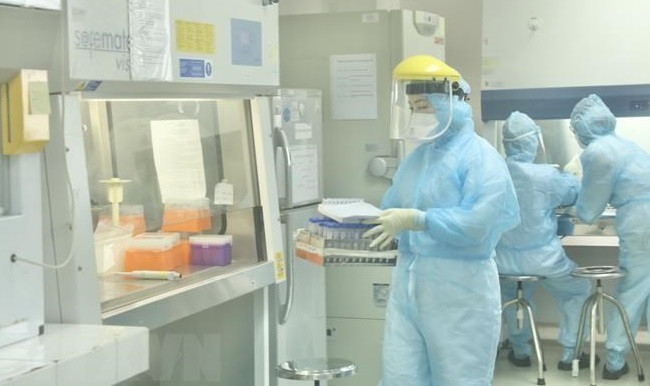 A health worker handles samples for COVID-19 testing at the Hanoi Centre for Disease Control (Photo: VNA)
A health worker handles samples for COVID-19 testing at the Hanoi Centre for Disease Control (Photo: VNA)It noted that when the threat of COVID-19 dawned, the government quicklyordered and strictly enforced border closures. Contact tracing was extensivefor all suspected cases of COVID-19, and all individuals suspected to have beenexposed to the virus were identified and isolated.
To implement this strategy of mass, coordinated quarantine,including cooking and delivering meals to those in isolation, employingsanitation efforts, contact tracing, and testing, required a large humanresource capacity, which the Vietnamese government recruited among medicalstudents and workers, party-affiliated social organisations, and the military.Social media, widely available in Vietnam, was used to promote public healthmessaging and dispel misinformation.
While Vietnam’s current outbreak isdwarfed by those in neighbours like Indonesia and the Philippines, the government continues to enforcequarantine regulations for all traced, suspected cases and strict regulationson foreign entry, according to the writing.
The article said the Vietnamese government is demonstratingthat it can deploy the necessary policies and resources of the state to thestrategies it chooses, whether that is protecting public health during a globalpandemic, or increasing accountability and transparency of governance toattract foreign investors. Certainly, the Vietnamese government’s public healthapproach was impressive, and the country was uniquely positioned to take on thechallenge of COVID-19.
The recent outbreaks will require Vietnam’s public healthministries and surveillance capabilities to maintain strong coordination withgovernment leadership as there is continued pressure to reopen the country toforeign tourists and business.
Vietnam has proven that it has strong and durableinstitutions that could protect the country’s public health through futurepandemics, without relying on vaccines alone.
The Vietnamese government has demonstrated it can enact aneffective preventative public health model through the structures of its stateif it so chooses, and perhaps that’s the lesson for other governments to learnif countries are each to prepare state-led pandemic responses in the future,the writing added./.




























